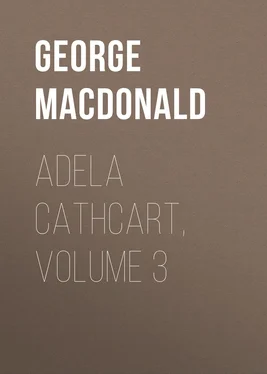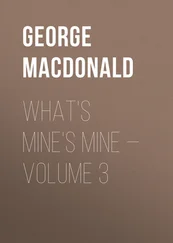George MacDonald - Adela Cathcart, Volume 3
Здесь есть возможность читать онлайн «George MacDonald - Adela Cathcart, Volume 3» — ознакомительный отрывок электронной книги совершенно бесплатно, а после прочтения отрывка купить полную версию. В некоторых случаях можно слушать аудио, скачать через торрент в формате fb2 и присутствует краткое содержание. Жанр: foreign_prose, foreign_religion, literature_19, foreign_antique, на английском языке. Описание произведения, (предисловие) а так же отзывы посетителей доступны на портале библиотеки ЛибКат.
- Название:Adela Cathcart, Volume 3
- Автор:
- Жанр:
- Год:неизвестен
- ISBN:нет данных
- Рейтинг книги:4 / 5. Голосов: 1
-
Избранное:Добавить в избранное
- Отзывы:
-
Ваша оценка:
- 80
- 1
- 2
- 3
- 4
- 5
Adela Cathcart, Volume 3: краткое содержание, описание и аннотация
Предлагаем к чтению аннотацию, описание, краткое содержание или предисловие (зависит от того, что написал сам автор книги «Adela Cathcart, Volume 3»). Если вы не нашли необходимую информацию о книге — напишите в комментариях, мы постараемся отыскать её.
Adela Cathcart, Volume 3 — читать онлайн ознакомительный отрывок
Ниже представлен текст книги, разбитый по страницам. Система сохранения места последней прочитанной страницы, позволяет с удобством читать онлайн бесплатно книгу «Adela Cathcart, Volume 3», без необходимости каждый раз заново искать на чём Вы остановились. Поставьте закладку, и сможете в любой момент перейти на страницу, на которой закончили чтение.
Интервал:
Закладка:
"Maidens' bairns are aye weel guided," says the Scotch proverb; and the same may be said of bachelors' wives. So I will cease the strain, and return to Adela, the change in whom first roused it.
Of late, I had seen a glimmer of something in her countenance which I had never seen before—a something which, the first time I perceived it, made me say to her, in my own hearing only: "Ah, my dear, we shall understand each other by and by!" And now and then the light in her eye would be dimmed as by the fore-shadowing of a tear, when there was no immediate and visible cause to account for it; and—which was very strange—I could not help fancying she began to be a little shy of her old uncle.—Could it be that she was afraid of his insight reaching to her heart, and reading there more than she was yet willing to confess to herself?—But whatever the cause of the change might be, there was certainly a responsiveness in her, a readiness to meet every utterance, and take it home, by which the vanity of the old bachelor would have been flattered to the full, had not his heart come first, and forestalled the delight.
So absorbed was I in considering these things, that the time passed like one of my thoughts; and before I knew I found myself on the verge of the perilous moor over which Harry had ridden in the teeth and heart of the storm. How smooth yet cruel it looked in its thick covering of snow! There was heather beneath, within which lay millions of purple bells, ready to rush out at the call of summer, and ring peals of merry gladness, making the desolate place not only blossom but rejoice as the rose. And there were cold wells of brown water beneath that snow, of depth unknown, which nourished nothing but the green grass that hid the cold glare of their presence from the eyes of the else warefully affrighted traveller. And I thought of Adela when I thought of the heather; and of some other woman whom I had known, when I thought of the wells.
When I came home, I told Adela where I had been, and what a desolate place it was. And the flush that rose on her pale cheek was just like the light of the sunset which I had left shining over the whiteness of that snowy region. And I said to myself: "It is so. And I trust it may be well."
As I walked home, I had bethought myself of a story which I had brought down with me in the hope of a chance of reading it, but which Adela's illness had put out of my mind; for it was only a child's story; and although I hoped older people might find something in it, it would have been absurd to read it without the presence of little children. So I said to Adela:
"Don't you know any little children in Purleybridge, Adela?"
"Oh! yes; plenty."
"Couldn't you ask some of them one night, and I would tell them a story. I think at this season they should have a share in what is going, and I have got one I think they would like."
"I shall be delighted. I will speak to papa about it at once. But next time—."
"Yes, I know. Next time Harry Armstrong was going to read; but to tell you the truth, Adela, I doubt if he will be ready. I know he is dreadfully busy just now, and I believe he will be thankful to have a reprieve for a day or two, and his story, which I expect will be a good one, will be all the better for it."
"Then I will speak to papa about it the moment he comes in; and you will tell Mr. Henry. And mind, uncle, you take the change upon your own shoulders."
"Trust me, my dear," I said, as I left the room.
As I had anticipated, Harry was grateful. Everything was arranged. So the next evening but one, we had a merry pretty company of boys and girls, none older, or at least looking older, than twelve. It did my heart good to see how Adela made herself at home with them, and talked to them as if she were one of themselves. By the time tea was over, I had made friends with them all, which was a stroke in its way nearly equal to Chaucer's, who made friends with all the nine and twenty Canterbury pilgrims before the sun was down. And the way I did was this. I began with the one next me, asking her the question:
"Do you like fairy-stories?"
"Yes, I do," answered she, heartily.
"Did you ever hear of the princess with the blue foot?"
"No. Will you tell me, please?"
Then I turned to the one on my other side, and asked her:
"Did you ever hear of the giant that was all skin—not skin and bone, you know, but all skin?"
"No-o" she answered, and her round blue eyes got rounder and bluer.
The next was a boy. I asked him:
"Did you ever hear of Don Worm of Wakemup?"
"No. Do please tell us about it."
And so I asked them, round the room. And by that time all eyes were fixed upon me. Then I said:
"You see I cannot tell you all these stories to-night. But would you all like one of some sort?"
A chorus of I should filled the room.
"What shall it be about, then?"
"A wicked fairy."
"No; that's stupid. I'm tired of wicked fairies," said a scornful little girl.
"A good giant, then," said a priggish imp, with a face as round as the late plum-pudding.
"I am afraid I could not tell you a story about a good giant; for unfortunately all the good giants I ever heard of were very stupid; so stupid that a story would not make itself about them; so stupid, indeed, that they were always made game of by creatures not half so big or half so good; and I don't like such stories. Shall I tell you about the wicked giant that grew little children in his garden instead of radishes, and then carried them about in his waistcoat pocket, and ate one as often as he remembered he had got some?"
"Yes, yes; please do."
"He used to catch little children and plant them in his garden, where you might see them in rows, with their heads only above ground, rolling their eyes about, and growing awfully fast. He liked greedy boys best—boys that ate plum-pudding till they felt as if their belts were too tight."
Here the fat-faced boy stuck both his hands inside his belt.
"Because he was so fond of radishes," I went on, "he lived just on the borders of Giantland, where it touched on the country of common people. Now, everything in Giantland was so big, that the common people saw only a mass of awful mountains and clouds; and no living man had ever come from it, as far as anybody knew, to tell what he had seen in it.
"Somewhere near these borders, on the other side, by the edge of a great forest, lived a labourer with his wife and a great many children. One day Tricksey-Wee, as they called her, teased her brother Buffy-Bob, till he could not bear it any longer, and gave her a box on the ear. Tricksey-Wee cried; and Buffy-Bob was so sorry and ashamed of himself, that he cried too, and ran off into the wood. He was so long gone, that Tricksey-Wee began to be frightened, for she was very fond of her brother; and she was so sorry that she had first teased him, and then cried, that at last she ran into the wood to look for him, though there was more chance of losing herself than of finding him. And, indeed, so it seemed likely to turn out; for, running on without looking, she at length found herself in a valley she knew nothing about. And no wonder; for what she thought was a valley with round, rocky sides, was no other than the space between two of the roots of a great tree that grew on the borders of Giantland. She climbed over the side of it, and right up to what she took for a black, round-topped mountain, far away; but she soon discovered that it was close to her, and was a hollow place so great that she could not tell what it was hollowed out of. Staring at it, she found that it was a doorway; and, going nearer and staring harder, she saw the door, far in, with a knocker of iron upon it, a great many yards above her head, and as large as the anchor of a big ship. Now, nobody had ever been unkind to Tricksey-Wee, and therefore she was not afraid of anybody. For Buffy-Bob's box on the ear she did not think worth considering. So, spying a little hole at the bottom of the door, which had been nibbled by some giant mouse, she crept through it, and found herself in an enormous hall, as big as if the late Mr. Martin, R.A., had been the architect. She could not have seen the other end of it at all, except for the great fire that was burning there, diminished to a spark in the distance. Towards this fire she ran as fast as she could, and was not far from it when something fell before her with a great clatter, over which she tumbled, and went rolling on the floor. She was not much hurt, however, and got up in a moment. Then she saw that she had fallen over something not unlike a great iron bucket. When she examined it more closely, she discovered that it was a thimble; and looking up to see who had dropped it, beheld a huge face, with spectacles as big as the round windows in a church, bending over her, and looking everywhere for the thimble. Tricksey-Wee immediately laid hold of it in both her arms, and lifted it about an inch nearer to the nose of the peering giantess. This movement made the old lady see where it was, and, her finger popping into it, it vanished from the eyes of Tricksey-Wee, buried in the folds of a white stocking, like a cloud in the sky, which Mrs. Giant was busy darning. For it was Saturday night, and her husband would wear nothing but white stockings on Sunday."
Читать дальшеИнтервал:
Закладка:
Похожие книги на «Adela Cathcart, Volume 3»
Представляем Вашему вниманию похожие книги на «Adela Cathcart, Volume 3» списком для выбора. Мы отобрали схожую по названию и смыслу литературу в надежде предоставить читателям больше вариантов отыскать новые, интересные, ещё непрочитанные произведения.
Обсуждение, отзывы о книге «Adela Cathcart, Volume 3» и просто собственные мнения читателей. Оставьте ваши комментарии, напишите, что Вы думаете о произведении, его смысле или главных героях. Укажите что конкретно понравилось, а что нет, и почему Вы так считаете.












